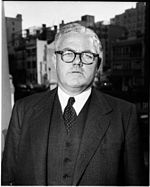New South Wales state election, 1956
|
|
||||||||||||||||||||||||||||||||||
|---|---|---|---|---|---|---|---|---|---|---|---|---|---|---|---|---|---|---|---|---|---|---|---|---|---|---|---|---|---|---|---|---|---|---|
|
||||||||||||||||||||||||||||||||||
|
All 94 seats in the New South Wales Legislative Assembly 48 Assembly seats were needed for a majority |
||||||||||||||||||||||||||||||||||
|
||||||||||||||||||||||||||||||||||

Legislative Assembly after the election
|
||||||||||||||||||||||||||||||||||
|
||||||||||||||||||||||||||||||||||
The 1956 New South Wales state election was held on 3 March 1956. It was conducted in single member constituencies with compulsory preferential voting and was held on boundaries created at a 1952 redistribution. The election was for all of the 94 seats in the Legislative Assembly.
In March 1956, Labor had been in power for 15 years and Joseph Cahill who had won a landslide victory at the 1953 election had been premier for 4 years. Cahill, who was commonly known as "old smoothie" had been a popular premier and had shown some flair in leadership by announcing a design competition for the Sydney Opera House in September 1955. However, nationally the Labor party was divided on sectarian and ideological grounds. In Victoria, many members of the predominantly Catholic right-wing of the party had left the party and joined the nascent Democratic Labor Party (DLP). Cahill was desperate to keep the New South Wales branch of the ALP united. He achieved this by controlling the anti-DLP faction led by his ex-minister Clive Evatt (brother of H V Evatt) while at the same time keeping the right-wing faction within the party. Cahill's attempts at unity were assisted by the state's Catholic hierarchy who were less politically involved than their Victorian counterparts under Daniel Mannix. As a result, the effects of this split were not as severe in New South Wales and the DLP did not contest the 1956 state election. However, the split did have a significant effect on the Labor Party's vote and contributed to the loss of the seat of Waratah.
Labor's election promises included making the supply of state housing a top priority, reviving the State Bank which had been under the control of the federal government since 1932 and revitalizing the state's railways including the long delayed Eastern Suburbs line.
...
Wikipedia

